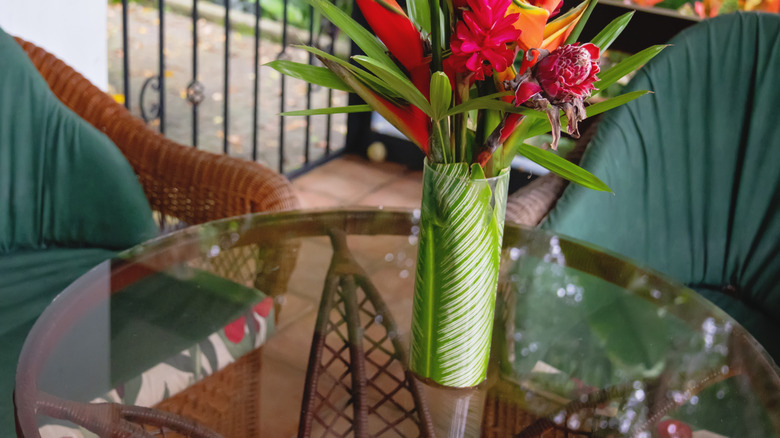Glass Vs Wood Patio Table: What Are The Pros And Cons?
The tabletop is often the centerpiece of your patio furniture. It's where you have your morning coffee, late afternoon chats, and weekend meals. That's why it makes sense for it to be both functional and visually appealing. Two options stand out when choosing the right material for a patio table: glass and wood. Glass tables lend a modern look and are easy to clean, but they're fragile and can create glare. On the other hand, wooden patio tables are versatile and naturally beautiful, with the downside of being pricey and high maintenance.
There are several factors to account for when trying to decide on a patio table material. Durability is first on that list. The patio table will be exposed to the elements at all times, so it should be able to withstand everything Mother Nature throws at it — rain, sunlight, bird poop stains, and so on. Plus, your patio tabletop will gather a lot of dirt, which is why it should be easy to clean; you may well end up wiping it down almost every day. You'll want to make sure the table is sturdy, too, and that wind doesn't flip it over. Last but not least, it should be compatible with the rest of the outdoor space. As common materials for outdoor furniture, glass and wood have different characteristics, and making the right choice comes down to weighing their pros and cons.
Pros and cons of glass outdoor tables
The simple yet elegant look of glass makes it a great choice if you're going for a modern or minimalist outdoor setting. In a way, it accentuates the openness of your patio or terrace. Because it reflects light, a glass tabletop makes your outdoor space appear brighter and more inviting. Glass is also smooth and non-porous, meaning it's super easy to clean. You don't have to worry about stains or mold, either. And let's not forget that glass tabletops meant for outdoor use are weatherproof because they're made of tempered glass, which is resistant to rain, UV, and other elements. You can even use glass as a protective cover for a wooden tabletop.
The downsides of glass patio furniture include that it can be somewhat fragile. Any heavy impact can damage the glass — and that's something you can't really repair. You'll need to be extremely careful when placing heavy items on the table. Keep in mind that shattered glass can be dangerous, especially if you have kids or pets. And, if you do have kids running around the patio, you may want to go for a curved tabletop instead of one with sharp corners to avoid painful accidents. Glass tabletops require a great deal of cleaning and upkeep, too. This is because the smallest smudge or fingerprint can stand out and ruin the aesthetic. Glare and heat can be another a problem with glass patio tabletops. Direct sunlight creates a annoying glare on glass surfaces. But with an umbrella, this shouldn't be an issue. Or, you can use frosted glass instead — it doesn't cause much glare.
Pros and cons of wooden outdoor tables
Wood is one of the most popular materials for outdoor furniture, including tabletops, and for good reason. It blends perfectly with plants and other natural elements in an outdoor design. Wooden tabletops add aesthetic value in the form of warmth and natural beauty. This makes them ideal for balconies and small terraces since they don't overwhelm the space. Wood also offers more variety with all the different types you can choose from: teak, cedar, acacia, oak, pine, eucalyptus — you name it. Plus, it's a very versatile material in the sense that you can find wooden tabletops in different shapes, styles, stains, and sizes. More importantly, wood is a champion in durability. Teak or cedar tabletops will last over a decade with good care. As some of the best types of wood for patio furniture, they are resistant to rot, decay, and pest damage. It's also worth mentioning that wooden tables are fairly easy to repair in case of minor damages.
On the flip side, wooden tabletops can be high-maintenance. You'll need to treat them with a protective sealant on a regular basis to avoid fading and moisture damage. On top of that, some types of wood don't do well in extreme weather conditions. Eventually, they start to warp and crack. This means you'll have to cover your outdoor furniture during the winter months. Another issue with wooden tables is that they tend to be on the higher end of the price spectrum — especially if they are made of high-quality wood, like oak or cedar. Of course, if you don't mind the price and the maintenance, wooden tabletops can be the perfect addition to your outdoor living space.


